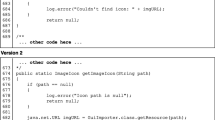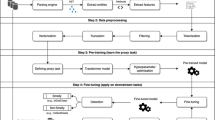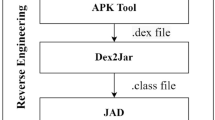Abstract
Software requirements are ever-changing which often leads to software evolution. Consequently, throughout software lifetime, developers receive new requirements often expressed as feature requests. To implement the requested features, developers sometimes apply refactorings to make their systems adapt to the new requirements. However, deciding what refactorings to apply is often challenging and there is still lack of automated support to recommend refactorings given a feature request. To this end, we propose a learning-based approach that recommends refactorings based on the history of the previously requested features, applied refactorings, and code smells information. First, the state-of-the-art refactoring detection tools are leveraged to identify the previous refactorings applied to implement the past feature requests. Second, a machine classifier is trained with the history data of the feature requests, code smells, and refactorings applied on the respective commits. Consequently, the machine classifier is used to predict refactorings for new feature requests. The proposed approach is evaluated on the dataset of 55 open source Java projects and the results suggest that it can accurately recommend refactorings (accuracy is up to 83.19%).







Similar content being viewed by others
References
Aggarwal CC, Zhai C (2012) A survey of text classification algorithms. In: Zhai C (ed) Aggarwal CC. Springer, Mining text data, pp 163–222
AlOmar EA, Mkaouer MW, Ouni A (2019) Can refactoring be self-affirmed?: An exploratory study on how developers document their refactoring activities in commit messages. In: Tsantalis N, Cai Y, Demeyer S (eds) Proceedings of the 3rd international workshop on refactoring, IWOR@ICSE 2019, Montreal, QC, Canada, May 28, 2019. IEEE/ACM, pp 51–58
Alspaugh TA, Scacchi W (2013) Ongoing software development without classical requirements. In: 21st IEEE International requirements engineering conference, RE 2013, Rio de Janeiro-RJ, Brazil, July 15–19, 2013. IEEE Computer Society, pp 165–174
Angerer F, Grimmer A, Prähofer H, Grünbacher P (2019) Change impact analysis for maintenance and evolution of variable software systems. Autom Softw Eng 26(2):417–461
Apache Projects Issues (2020) (Retrived on 12th March 2020). In: https://issues.apache.org/jira/projects/
Bavota G, Lucia AD, Marcus A, Oliveto R (2014) Recommending refactoring operations in large software systems. In: Robillard MP, Maalej W, Walker RJ, Zimmermann T (eds) Recommendation systems in software engineering. Springer, pp 387–419
Bavota G, Lucia AD, Marcus A, Oliveto R (2014) Automating extract class refactoring: an improved method and its evaluation. Empir Softw Eng 19 (6):1617–1664
Bugzilla (2019) (Accessed October 2019) https://www.bugzilla.org/
Chaparro O, Bavota G, Marcus A, Penta MD (2014) On the impact of refactoring operations on code quality metrics. In: 30th IEEE International conference on software maintenance and evolution, Victoria, BC, Canada, September 29–October 3, 2014, pp 456–460
Chen J, Huang H, Tian S, Qu Y (2009) Feature selection for text classification with naïve bayes. Expert Syst Appl 36(3):5432–5435
Codacy (2019) (Accessed October 2019) https://github.com/marketplace/codacy
Feng W, Sun J, Zhang L, Cao C, Yang Q (2016) A support vector machine based naive bayes algorithm for spam filtering. In: 35th IEEE international performance computing and communications conference, IPCCC 2016, Las Vegas, NV, USA, December 9–11, 2016, pp 1–8
Fokaefs M, Tsantalis N, Chatzigeorgiou A (2007) Jdeodorant: Identification and removal of feature envy bad smells. In: ICSM 2007. IEEE International conference on software maintenance 2007. IEEE, pp 519–520
Fokaefs M, Tsantalis N, Stroulia E, Chatzigeorgiou A (2011) Jdeodorant: identification and application of extract class refactorings. In: Proceedings of the 33rd international conference on software engineering, ICSE 2011, Waikiki, Honolulu , HI, USA, May 21–28, 2011, pp 1037–1039
Fokaefs M, Tsantalis N, Stroulia E, Chatzigeorgiou A (2012) Identification and application of extract class refactorings in object-oriented systems. J Syst Softw 85(10):2241–2260
Fowler M (1999) Refactoring—improving the design of existing code. Addison Wesley object technology series. Addison-Wesley
Gibaja E, Ventura S (2015) A tutorial on multilabel learning. ACM Comput Surv 47(3):52:1–52:38
Git Bash Commands (2018) (Retrived on 28th November 2018). In: https://www.atlassian.com/git
GitHub (2019) (Accessed October 2019) https://github.com/features
Godbole S, Sarawagi S (2004) Discriminative methods for multi-labeled classification. In: Dai H, Srikant R, Zhang C (eds) Advances in knowledge discovery and data mining, 8th Pacific-Asia Conference, PAKDD 2004, Sydney, Australia, May 26-28, 2004, Proceedings, Springer, Lecture Notes in Computer Science, vol 3056, pp 22–30
Heck P, Zaidman A (2013) An analysis of requirements evolution in open source projects: recommendations for issue trackers. In: 13th International workshop on principles of software evolution, IWPSE 2013, Proceedings, August 19–20, 2013, Saint Petersburg, pp 43–52
Hegedüs P, Kádár I, Ferenc R, Gyimóthy T (2018) Empirical evaluation of software maintainability based on a manually validated refactoring dataset. Inf Softw Technol 95:313–327
Jayatilleke S, Lai R, Reed K (2018) A method of requirements change analysis. Requir Eng 23(4):493–508
Jiang L, Cai Z, Zhang H, Wang D (2013) Naive bayes text classifiers: a locally weighted learning approach. J Exp Theor Artif Intell 25(2):273–286
JIRA (2019) (Accessed October 2019) https://www.atlassian.com/software/jira
Kessentini M, Dea TJ, Ouni A (2017) A context-based refactoring recommendation approach using simulated annealing: two industrial case studies. In: Proceedings of the genetic and evolutionary computation conference, GECCO 2017, Berlin, Germany, July 15–19, 2017, pp 1303–1310
Khan A, Baharudin B, Lee LH, Khan K, Tronoh UTP (2010) A review of machine learning algorithms for text-documents classification. J Adv Inf Technol 1(1):4–20
Kim M, Gee M, Loh A, Rachatasumrit N (2010) Ref-finder: a refactoring reconstruction tool based on logic query templates. In: Proceedings of the 18th ACM SIGSOFT international symposium on foundations of software engineering, 2010, Santa Fe, NM, USA, November 7–11, 2010, pp 371–372
Kim M, Zimmermann T, Nagappan N (2012) A field study of refactoring challenges and benefits. In: 20th ACM SIGSOFT symposium on the foundations of software engineering (FSE-20), SIGSOFT/FSE’12, Cary, NC, USA–November 11–16, 2012, p 50
Lin Y, Peng X, Cai Y, Dig D, Zheng D, Zhao W (2016) Interactive and guided architectural refactoring with search-based recommendation. In: Proceedings of the 24th ACM SIGSOFT international symposium on foundations of software engineering, FSE 2016, Seattle, WA, USA, November 13–18, 2016, pp 535–546
Liu H, Ma Z, Shao W, Niu Z (2012) Schedule of bad smell detection and resolution: a new way to save effort. IEEE Trans Software Eng 38 (1):220–235
Liu H, Guo X, Shao W (2013) Monitor-based instant software refactoring. IEEE Trans Softw Eng 39(8):1112–1126
Liu H, Xu Z, Zou Y (2018) Deep learning based feature envy detection. In: Proceedings of the 33rd ACM/IEEE international conference on automated software engineering, ASE 2018, Montpellier, France, September 3–7, 2018, pp 385–396
Loper E, Bird S (2002) NLTK: the natural language toolkit. In: ACL workshop effective tools and methodologies for teaching on natural language processing and computational linguistics (ETMTNLP), pp 63–70
Mahmoud A, Niu N (2014) Supporting requirements to code traceability through refactoring. Requir Eng 19(3):309–329
Manning CD, Schütze H (2001) Foundations of statistical natural language processing. MIT Press, Cambridge
Manning CD, Raghavan P, Schütze H (2008) Introduction to information retrieval. Cambridge University Press, Cambridge
Mei H, Zhang L (2018) Can big data bring a breakthrough for software automation? Science China Inf Sci 61(5):056101:1–056101:3
Mens T, Tourwé T (2004) A survey of software refactoring. IEEE Trans Softw Eng 30(2):126–139
Moha N, Guéhéneuc Y, Duchien L, Meur AL (2010) DECOR: a method for the specification and detection of code and design smells. IEEE Trans Softw Eng 36(1):20–36
Mohan M, Greer D (2018) A survey of search-based refactoring for software maintenance. J Softw Eng R&D 6:3
Murphy-Hill ER, Parnin C, Black AP (2012) How we refactor, and how we know it. IEEE Trans Software Eng 38(1):5–18
Nizamani ZA, Liu H, Chen DM, Niu Z (2018) Automatic approval prediction for software enhancement requests. Autom Softw Eng 25(2):347–381
Niu N, Bhowmik T, Liu H, Niu Z (2014) Traceability-enabled refactoring for managing just-in-time requirements. In: IEEE 22nd international requirements engineering conference, RE 2014, Karlskrona, Sweden, August, 25–29, 2014, pp 133–142
Nyamawe AS, Liu H, Niu Z, Wang W, Niu N (2018) Recommending refactoring solutions based on traceability and code metrics. IEEE Access 6:49460–49475
Nyamawe AS, Liu H, Niu N, Umer Q, Niu Z (2019) Automated recommendation of software refactorings based on feature requests. In: Damian D E, Perini A, Lee S (eds) 27th IEEE International requirements engineering conference, RE 2019, Jeju Island, Korea (South), September 23–27, 2019. IEEE , pp 187–198
Ouni A, Kessentini M, Sahraoui HA, Hamdi MS (2013) The use of development history in software refactoring using a multi-objective evolutionary algorithm. In: Genetic and evolutionary computation conference, GECCO ’13, Amsterdam, The Netherlands, July 6–10, 2013, pp 1461–1468
Ouni A, Kessentini M, Sahraoui HA, Inoue K, Hamdi MS (2015) Improving multi-objective code-smells correction using development history. J Syst Softw 105:18–39
Ouni A, Kessentini M, Sahraoui HA, Inoue K, Deb K (2016) Multi-criteria code refactoring using search-based software engineering: an industrial case study. ACM Trans Softw Eng Methodol 25(3):23:1–23:53
Ouni A, Kessentini M, Cinnéide MÓ, Sahraoui HA, Deb K, Inoue K (2017) MORE: a multi-objective refactoring recommendation approach to introducing design patterns and fixing code smells. J Softw: Evol Process 29(5)
Palomba F, Salza P, Ciurumelea A, Panichella S, Gall HC, Ferrucci F, Lucia AD (2017) Recommending and localizing change requests for mobile apps based on user reviews. In: Uchitel S, Orso A, Robillard M P (eds) Proceedings of the 39th international conference on software engineering, ICSE 2017, Buenos Aires, Argentina, May 20–28, 2017. IEEE/ACM, pp 106–117
Palomba F, Zaidman A, Oliveto R, Lucia AD (2017) An exploratory study on the relationship between changes and refactoring. In: Proceedings of the 25th international conference on program comprehension, ICPC 2017, Buenos Aires, Argentina, May 22–23, 2017, pp 176–185
Pantiuchina J, Bavota G, Tufano M, Poshyvanyk D (2018) Towards just-in-time refactoring recommenders. In: Proceedings of the 26th conference on program comprehension, ICPC 2018, Gothenburg, Sweden, May 27–28, 2018, pp 312–315
PMDCodacy (2019) (Accessed October 2019) https://github.com/codacy/codacy-pmdjava
Porter MF (2006) An algorithm for suffix stripping. Program 40 (3):211–218
Rath M, Rendall J, Guo JLC, Cleland-Huang J, Mäder P (2018) Traceability in the wild: automatically augmenting incomplete trace links. In: Chaudron M, Crnkovic I, Chechik M, Harman M (eds) Proceedings of the 40th international conference on software engineering, ICSE 2018, Gothenburg, Sweden, May 27–June 03, 2018. ACM, pp 834–845
Ratzinger J, Sigmund T, Vorburger P, Gall HC (2007) Mining software evolution to predict refactoring. In: Proceedings of the first international symposium on empirical software engineering and measurement, ESEM 2007, September 20–21, 2007, Madrid, pp 354–363
Runeson P, Alexandersson M, Nyholm O (2007) Detection of duplicate defect reports using natural language processing. In: 29th International conference on software engineering (ICSE 2007), Minneapolis, MN, USA, May 20–26, 2007. IEEE Computer Society, pp 499–510
Schapire RE, Singer Y (2000) Boostexter: a boosting-based system for text categorization. Mach Learn 39(2/3):135–168
Scikit-learn (Accessed October 2019) https://scikit-learn.org/stable/
Silva D, Tsantalis N, Valente MT (2016) Why we refactor? Confessions of GitHub contributors. In: Proceedings of the 24th ACM SIGSOFT international symposium on foundations of software engineering, FSE 2016, Seattle, WA, USA, November 13–18, 2016, pp 858–870
Silva D, Valente MT (2017) Refdiff: detecting refactorings in version histories. In: Proceedings of the 14th international conference on mining software repositories, MSR 2017, Buenos Aires, Argentina, May 20–28, 2017, pp 269–279
Simon F, Steinbrückner F, Lewerentz C (2001) Metrics based refactoring. In: Fifth conference on software maintenance and reengineering, CSMR 2001, Lisbon, Portugal, March 14–16, 2001, pp 30–38
Soares G, Catao B, Varjao C, Aguiar S, Gheyi R, Massoni T (2011) Analyzing refactorings on software repositories. In: 25th Brazilian symposium on software engineering, SBES 2011, Sao Paulo, Brazil, September 28–30, 2011. IEEE Computer Society, pp 164–173
Sun C, Lo D, Wang X, Jiang J, Khoo S (2010) A discriminative model approach for accurate duplicate bug report retrieval. In: Kramer J, Bishop J, Devanbu P T, Uchitel S (eds) Proceedings of the 32nd ACM/IEEE international conference on software engineering—volume 1, ICSE 2010, Cape Town, South Africa, 1–8 May 2010. ACM, pp 45–54
Tan L, Bockisch C (2019) A survey of refactoring detection tools. In: Krusche S, Schneider K, Kuhrmann M, Heinrich R, Jung R, Konersmann M, Schmieders E, Helke S, Schaefer I, Vogelsang A, Annighöfer B, Schweiger A, Reich M, van Hoorn A (eds) Proceedings of the workshops of the software engineering conference 2019, Stuttgart, Germany, February 19, 2019, CEUR-WS.org, CEUR Workshop Proceedings, vol 2308, pp 100–105
Terra R, Valente MT, Miranda S, Sales V (2018) JMove: a novel heuristic and tool to detect move method refactoring opportunities. J Syst Softw 138:19–36
Thung F, Wang S, Lo D, Lawall JL (2013) Automatic recommendation of API methods from feature requests. In: 2013 28th IEEE/ACM international conference on automated software engineering, ASE 2013, Silicon Valley, CA, USA, November 11–15, 2013, pp 290–300
Thung F, Kochhar PS, Lo D (2014) Dupfinder: integrated tool support for duplicate bug report detection. In: Crnkovic I, Chechik M, Grünbacher P (eds) ACM/IEEE international conference on automated software engineering, ASE ’14, Vasteras, Sweden–September 15–19, 2014. ACM, pp 871–874
Tsantalis N, Chatzigeorgiou A (2009) Identification of move method refactoring opportunities. IEEE Trans Softw Eng 35(3):347–367
Tsantalis N, Chatzigeorgiou A (2011) Ranking refactoring suggestions based on historical volatility. In: 15th European conference on software maintenance and reengineering, CSMR 2011, 1–4 March, 2011, Oldenburg, pp 25–34
Tsantalis N, Mansouri M, Eshkevari LM, Mazinanian D, Dig D (2018) Accurate and efficient refactoring detection in commit history. In: Proceedings of the 40th international conference on software engineering, ICSE 2018, Gothenburg, Sweden, May 27–June 03, 2018, pp 483–494
Uysal AK, Günal S (2014) The impact of preprocessing on text classification. Inf Process Manag 50(1):104–112
Vidal SA, Marcos CA, Pace JAD (2014) An approach to prioritize code smells for refactoring. Autom Softw Eng 23(3):501–532
Xu S, Sivaraman A, Khoo S, Xu J (2017) GEMS: an extract method refactoring recommender. In: 28th IEEE International symposium on software reliability engineering, ISSRE 2017, Toulouse, France, October 23–26, 2017, pp 24–34
Yue R, Gao Z, Meng N, Xiong Y, Wang X, Morgenthaler J D (2018) Automatic clone recommendation for refactoring based on the present and the past. In: 2018 IEEE international conference on software maintenance and evolution, ICSME 2018, Madrid, Spain, September 23–29, 2018, pp 115–126
Zhang M, Zhou Z (2014) A review on multi-label learning algorithms. IEEE Trans Knowl Data Eng 26(8):1819–1837
Acknowledgements
The authors would like to say thanks to the anonymous reviewers of this manuscript as well as to the program chairs and the anonymous reviewers of RE’19 conference for their insightful comments and constructive suggestions. This work is partially supported by the National Natural Science Foundation of China (No. 61772071 and No. 61690205), and the U.S. National Science Foundation Award (CCF-1350487).
Author information
Authors and Affiliations
Corresponding author
Additional information
Communicated by: Kelly Blincoe, Daniela Damian, and Anna Perini
Publisher’s note
Springer Nature remains neutral with regard to jurisdictional claims in published maps and institutional affiliations.
This article belongs to the Topical Collection: Requirements Engineering
Rights and permissions
About this article
Cite this article
Nyamawe, A.S., Liu, H., Niu, N. et al. Feature requests-based recommendation of software refactorings. Empir Software Eng 25, 4315–4347 (2020). https://doi.org/10.1007/s10664-020-09871-2
Published:
Issue Date:
DOI: https://doi.org/10.1007/s10664-020-09871-2




